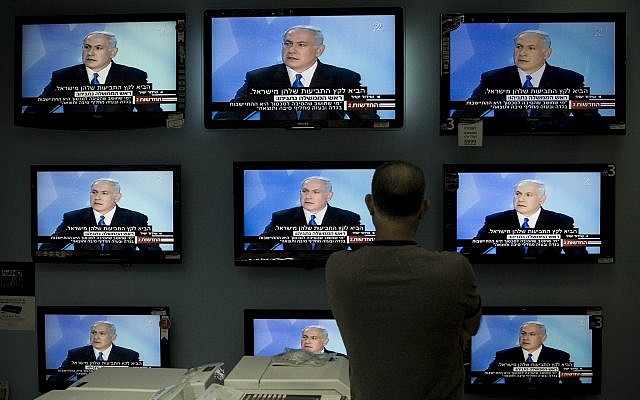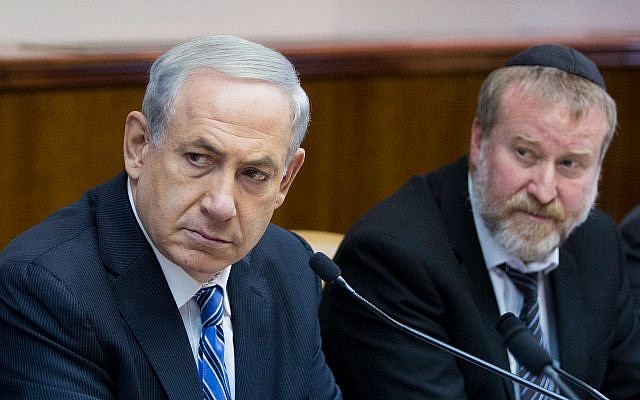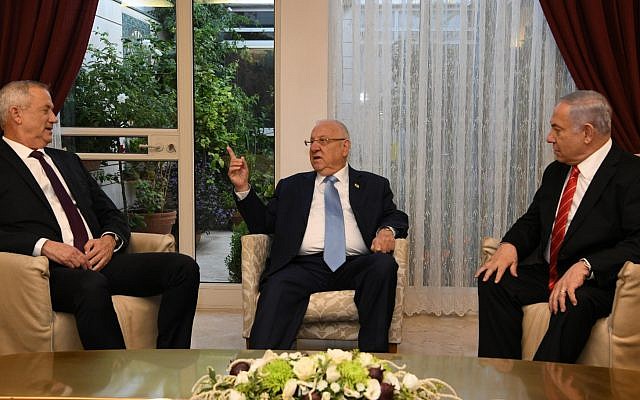PM doesn’t say if he’ll attend October 2-3 hearing with attorney general for pending corruption charges, insists he has ‘nothing to hide’

Prime Minister Benjamin Netanyahu on Thursday urged Attorney General Avichai Mandelblit to allow his pre-indictment hearing next week in a series of corruption cases to be broadcast live.
“After three years of a deluge of biased, partial leaks, the time has come for the public to hear everything. Including my side, in a complete and full manner — without mediators, without censorship and without distortions,” Netanyahu said in a video uploaded to his social media channels.
Netanyahu pointed to the recent live broadcasts of Central Elections Committee meetings and of President Reuven Rivlin’s post-election consultations with political parties, saying “this is needed” for his hearing, too.
Netanyahu denies all the allegations against him and has labeled them bids by his enemies to force him from office, which he has held for a total of over 13 years, the longest in Israeli history.
“There will be leaks anyway, we’ve seen 300 leaks already that were not addressed or investigated. That practice will continue,” he said. “So why let the public be fed partial information only?”
“Not only do I have nothing to hide, I want everything to be heard,” he said, adding that a live broadcast was “how we can ensure justice and truth.”

Netanyahu’s legal representatives are scheduled to appear before Mandelblit on October 2-3 to make his case ahead of a final decision by the attorney general on whether to indict him. In February, Mandelblit announced his intention to indict Netanyahu, pending the hearing, on charges of fraud and breach of trust in three separate cases, as well as bribery in one on them.
In his Thursday video, Netanyahu did not say whether he would attend his hearing, which comes as lawmakers in the 22nd Knesset, who were elected last week in a vote that deepened Israel’s months-long political gridlock, will be sworn into the parliament.
The most serious of the three investigations into the prime minister, Case 4000, involves accusations that Netanyahu advanced regulatory decisions that benefited Shaul Elovitch, the controlling shareholder in the Bezeq telecom giant, to the tune of hundreds of millions of dollars, in exchange for positive coverage from its Walla news site. That case includes a proposed bribery charge for both Netanyahu and Elovitch.
Another, Case 1000, involves accusations that Netanyahu received gifts and benefits from billionaire benefactors. Mandelblit said he intends to charge Netanyahu with fraud and breach of trust — the latter an offense relating to an official violating the trust the public has placed in him.
A third, Case 2000, revolves around accusations Netanyahu agreed with Yedioth Ahronoth newspaper publisher Arnon Mozes to weaken a rival daily in return for more favorable coverage from Yedioth. In this case, Mandelblit will seek to also charge the premier with breach of trust, while Mozes will be charged with bribery. Mozes underwent his own pre-indictment hearing last month.
Netanyahu suffered a major setback in the September 17 elections when he and his political allies failed to win a majority needed to form a government.

It’s widely believed that had Netanyahu won the election with a clear majority, he would have pursued immunity from prosecution via a Knesset vote and then sought legislation to prevent the Supreme Court from overturning any such decision. In the final days of the campaign, Netanyahu was evasive when asked whether he would seek to limit the powers of the Supreme Court.
But neither Netanyahu nor Blue and White leader Benny Gantz received enough support to form a government. Netanyahu has been endorsed as preferred prime minister by 55 MKs; Gantz has the backing of 54.
On Wednesday, Rivlin tasked Netanyahu with assembling a coalition, prompting the prime minister to again appeal to Gantz to join forces and form a unity government. Gantz has rebuffed the offer, saying he wouldn’t partner with Netanyahu so long as he faces a serious criminal indictment.
As reported by The Times of Israel
